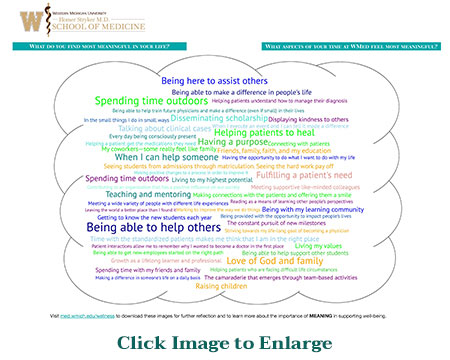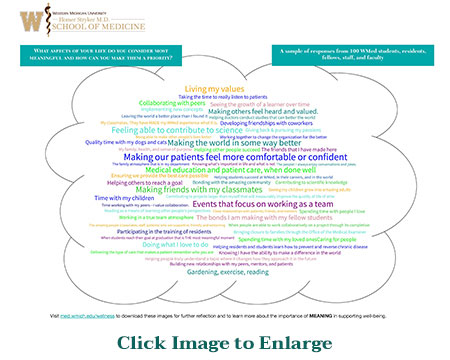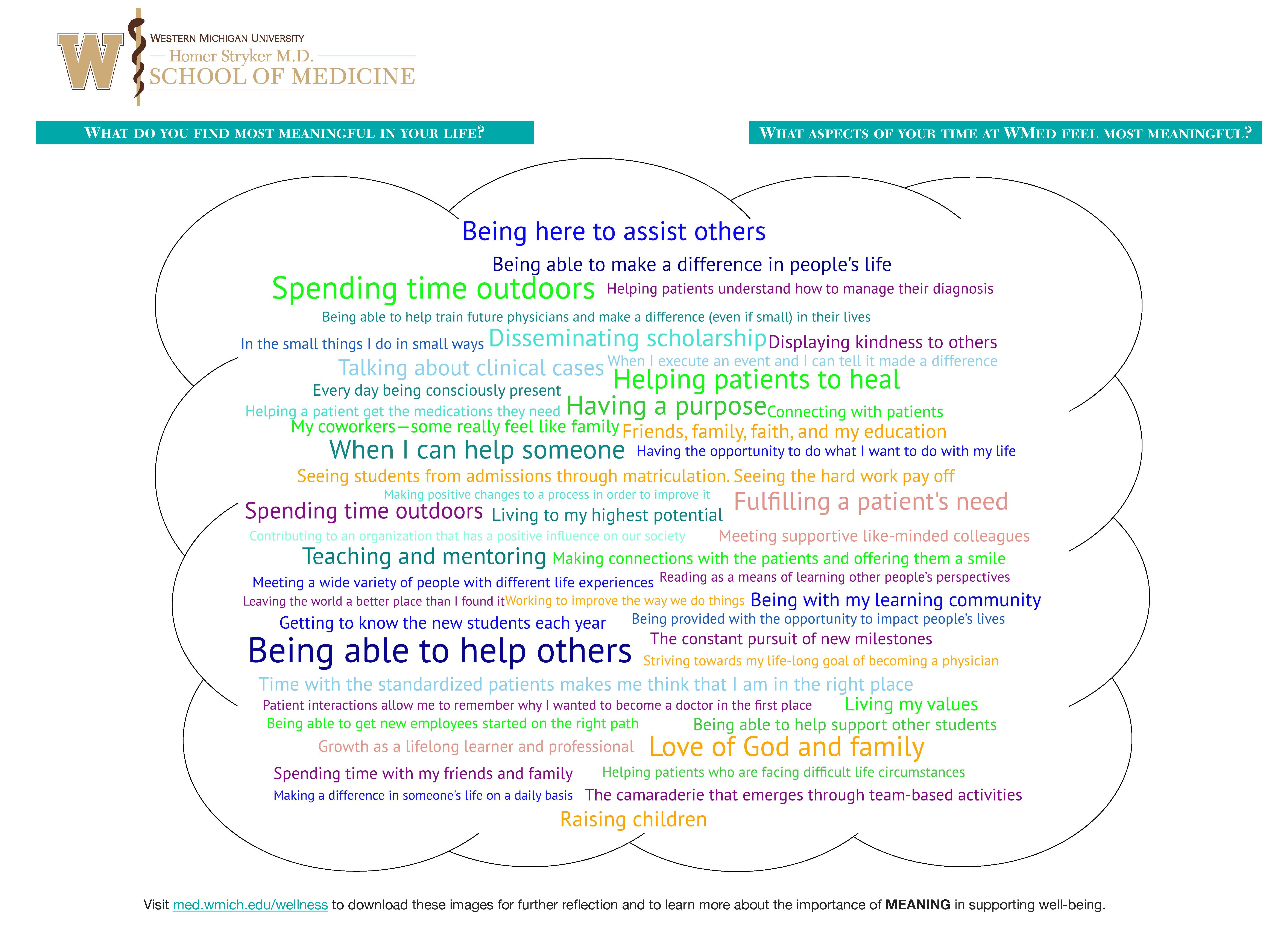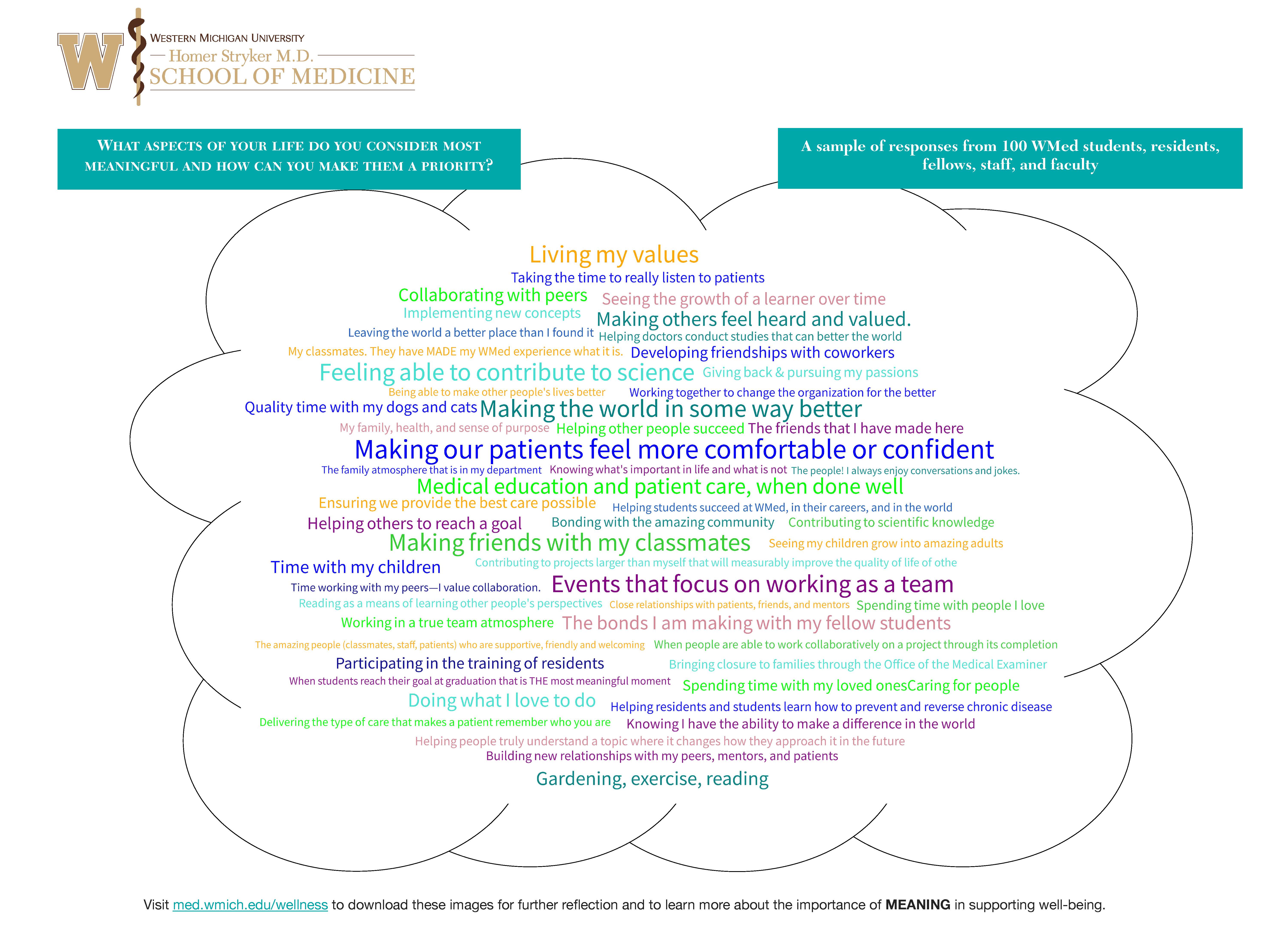At WMed, we are committed to living our Values and improving our culture as we continue to grow.
Together we:
- Excel with integrity and professionalism
- Champion safety and belonging
- Listen, collaborate, and serve with respect and compassion
We seek to create an inspiring environment to learn, teach, and work that embodies our values AND to promote a climate of cultural and psychological safety, equity, cultural humility, engagement, trust, accountability, recognition, wellness, belonging, and cohesion.
If you have questions or want to receive calendar invites to any events, please email culture@wmed.edu. Events are also listed and hyperlinked in the Pulse calendar and included in our weekly Wellness/Culture emails.
-
Psychological Safety is a concept that comes from the business world. Researchers such as Amy Edmondson, PhD at Harvard Business School have demonstrated that organizations where members feel comfortable being both ‘contributors’ and ‘challengers’ tend to have high levels of employee engagement and performance outcomes. Timothy Clark, PhD has developed a 4-stage model of psychological safety, which highlights how individuals first need to feel 1) inclusion safety, and 2) learner safety, before feeling safe to 3) contribute and 4) challenge.
WMed kicked off a five-month Psychological Safety 1.0 Initiative with a keynote address by Timothy Clark in January of 2021. A recording is available on the WMed Portal (Login Required). This event was then followed by four months of programming, each focusing on a different stage.
Stage 1: Inclusion Safety
How do we make others feel included?
Values in Action: Respect one another & Serve with empathyStage 2: Learner Safety
How do we make others feel safe and motivated to learn?
Value in Action: Seek to understandStage 3: Contributor Safety
How do you make others feel safe enough to contribute and make a difference?
Values in Action: Strive for excellence & Celebrate effort and achievementStage 4: Challeger Safety
How do you make others feel safe enough to challenge the status quo, innovate, and make things better?
Values in Action: Speak up to inform & Act with integrityOur current Psychological Safety Initiative includes training Psychological Safety Representatives from across WMed departments, offering resources to our leaders to foster psychological safety among their teams, and sharing examples of best practices throughout WMed. Visit the WMed Portal (Login Required) for additional resources, infographics, educational opportunities, and recordings from our previous events.
-
 These Word Clouds depict 100 responses from the WMed community regarding the questions: "What do you find most meaningful in your life?" and "What aspects of your time at WMed feel most meaningful?"
These Word Clouds depict 100 responses from the WMed community regarding the questions: "What do you find most meaningful in your life?" and "What aspects of your time at WMed feel most meaningful?"As you reflect on these responses, we encourage you to consider these questions in your own life. The idea behind this project is that the meaning (or purpose) one finds in their workplace and in their life more generally is an important aspect of well-being—both in bolstering emotional and physical health, and in buffering against burnout. The hope of this project is to foster awareness and conversation around the topic of meaning.
 The impact of finding meaning in one's life has been considered in research, not only in the context of emotional health, but also physical health. Just recently, an article in JAMA,1 highlighted "life purpose" as a longitudinal predictor of health outcomes and mortality in the general population. Also, within the field of medicine, research suggests that resident burnout can be buffered by highlighting aspects of residency that tend to provide meaning (patient care, intellectual engagement, respect, and community).2 In a more general way, Jager et al. (2017) demonstrated that physicians who experience more burnout are “less likely to identify with medicine as a calling.” As they conclude, "erosion of the sense that medicine is a calling may have adverse consequences for physicians as well as those whom they care for."3
The impact of finding meaning in one's life has been considered in research, not only in the context of emotional health, but also physical health. Just recently, an article in JAMA,1 highlighted "life purpose" as a longitudinal predictor of health outcomes and mortality in the general population. Also, within the field of medicine, research suggests that resident burnout can be buffered by highlighting aspects of residency that tend to provide meaning (patient care, intellectual engagement, respect, and community).2 In a more general way, Jager et al. (2017) demonstrated that physicians who experience more burnout are “less likely to identify with medicine as a calling.” As they conclude, "erosion of the sense that medicine is a calling may have adverse consequences for physicians as well as those whom they care for."3Experiencing a sense of meaning in one's life is relevant for all of us, regardless of our professional roles. The importance of finding meaning was compellingly articulated by Victor Frankl in 1946 in his book “Man’s Search for Meaning”4 — a text written out of his professional work as a psychiatrist and his experience as a prisoner in Nazi concentration camps during World War II. His creation of logotherapy (named after the Greek word, logos, which can be translated as “reason”), is based on three basic ideas:
- life always has meaning even when things are hopeless
- the will to meaning is the most important factor in motivating a person to live
- people can find meaning through experience and action
We hope these ideas offer kindling for your own reflections on where you find meaning in your life and how you can make the most of these experiences.- Alimujiang,A. et al. Association between life purpose and mortality among US adults older than 50 years. JAMA Network Open.2019;2(5):e194270.doi:10.1001/jamanetworkopen.2019.4270
- Berg, DD et al. Fostering meaning in residency to curb the epidemic of resident burnout: Recommendations from four chief medical residents. Acad Med, 2019, July 9.
- Jager, A et al. Association between physician burnout and identification with medicine as a calling. Mayo Clinic Proceedings (Mar 2017), 92(3), 415-422.
- Frankl, V. Man’s Search for Meaning. Beacon Press: Boston, MA; 1946
-
As we continue to grow our medical school, the "WMed Welcomes" video offers a greeting from some of our wonderful faculty, staff, residents and students.
Behind the Scenes @WMed is a video series that offers opportunities to be reminded of the faces and voices of those who we work and learn with at WMed.
Watch Episodes 1, 2, 3, and 4 of Behind the Scenes @WMed (Login Required)



